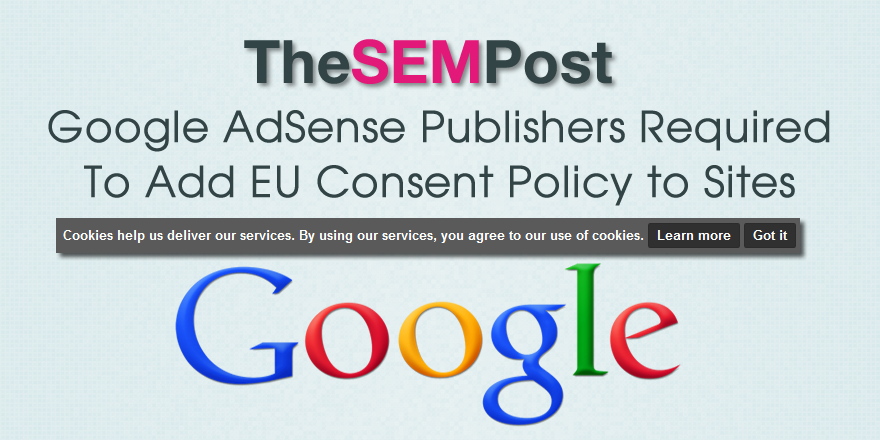

You have probably all come across instances where you see something asking you for permission for cookies on the top of a website, something that is especially common for websites based in the EU. Well, with this change, we will be seeing a lot more of them.
All AdSense publishers are required to add the EU user consent policy to all EU site visitors to their site, in order to ask permission to use their data.
Why are we doing this?
European Union data protection authorities requested some changes to current practices for obtaining end user consents. It has always been Google’s policy to comply with privacy laws, so we’ve agreed to make certain changes affecting our own products and partners using Google products.
According to Google, it affects not just AdSense publishers but also those using the DoubleClick Ad Exchange and DoubleClick for Publishers.
Here is an example of a typical EU consent policy implementation:

Complicating the issue is the fact Google cannot just give publishers a sample consent policy to use, as they say each website could require something different and will “largely depend on your own uses of cookies and other information, and the third party services you work with.”
You don’t have to serve the consent policy to non-EU visitors, however you would need to implement your own geo-targeting for the policy in order to do this. So many webmasters will likely implement this for all users, at least at the beginning.
You are also required to add the consent policy to the mobile version of the site as well.
Google does have a FAQ for the EU consent policy that answers some of the common questions with this change. They also launched a new website, Cookie Choices which aims to help webmasters with the implementation of the new consent policy.
They do include third parties that offer tools to add this new consent to your website.
There are vendors that offer tools or solutions to add a cookie consent function to your website, some of which are free of charge. For example:
- Cookie Consent by SilkTide
- Cookie Control by CIVIC
- The Cookie Collective by Governor Technology
- Cookiebot by Cybot
- Cookie Consent Kit by the European Commission
Google doesn’t list a deadline for when the change needs to be implemented, but say they “recommend you start working on a policy-compliant user consent mechanism today.”
Jennifer Slegg
Latest posts by Jennifer Slegg (see all)
- 2022 Update for Google Quality Rater Guidelines – Big YMYL Updates - August 1, 2022
- Google Quality Rater Guidelines: The Low Quality 2021 Update - October 19, 2021
- Rethinking Affiliate Sites With Google’s Product Review Update - April 23, 2021
- New Google Quality Rater Guidelines, Update Adds Emphasis on Needs Met - October 16, 2020
- Google Updates Experiment Statistics for Quality Raters - October 6, 2020